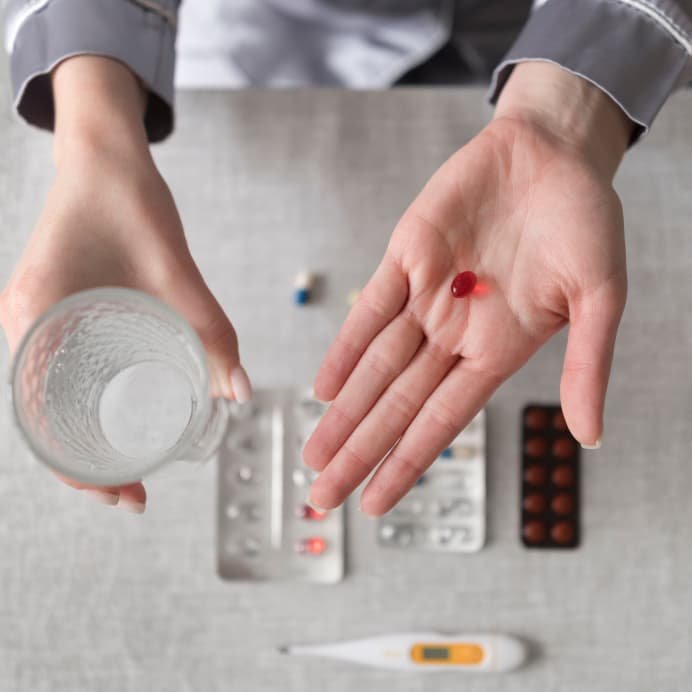Painkiller Addiction Treatment
Painkiller Addiction Treatment
Comprehensive Painkiller Addiction Treatment
Painkiller addiction is a growing concern that affects millions of individuals worldwide. Addressing the complexities of painkiller addiction requires a multifaceted approach. Our program combines medical oversight with counseling to help individuals overcome dependence on painkillers, providing tools for managing pain and promoting long-term recovery.
Understanding Painkiller Addiction
Painkiller addiction involves the compulsive use of prescription or over-the-counter medications designed to alleviate pain. The opioids within these medications attach to the brain’s opioid receptors, inhibiting pain signals and inducing feelings of relaxation and euphoria. While painkiller use may begin with a legitimate medical need for pain management, it can escalate into uncontrollable use, resulting in tolerance and dependence, where the body relies on the drug for normal functioning.


Causes of Painkiller Addiction
The causes of painkiller addiction are multifaceted and can include:
- Chronic Pain: Individuals with chronic pain conditions may become dependent on painkillers to manage their pain, leading to addiction.
- Genetic Factors: A genetic predisposition to addiction can make some individuals more susceptible to developing a dependence on painkillers.
- Mental Health Issues: People with underlying mental health disorders, such as anxiety or depression, may misuse painkillers as a form of self-medication.
- Environmental Influences: Exposure to environments where drug use is normalized or peer pressure can contribute to the development of addiction.
- Previous Substance Abuse: Individuals with a history of substance abuse are at a higher risk of developing painkiller addiction.
Warning Signs of Painkiller Addiction
Recognizing the warning signs of painkiller addiction is crucial for timely intervention and seeking appropriate help. Here are some common indicators:
- Increased Tolerance: Developing a need for higher doses of painkillers to achieve the same level of relief or euphoria, indicating potential addiction.
- Withdrawal Symptoms: Experiencing physical and psychological symptoms when attempting to reduce or stop using painkillers, including restlessness, muscle aches, anxiety, irritability, insomnia, and gastrointestinal discomfort.
- Neglected Responsibilities: Prioritizing painkiller use over fulfilling work, school, or home obligations, leading to poor performance, absenteeism, strained relationships, or neglect of responsibilities.
- Changes in Behavior: Notable shifts in behavior, such as increased secrecy, isolation, mood swings, or loss of interest in once-enjoyed activities, signaling potential addiction.
- Prescription Misuse: Engaging in the misuse of prescription painkillers, including using others’ prescriptions, taking higher doses than prescribed, or obtaining them through illegal means.

Why Choose 911 Detox recovery for Alcohol Rehabilitation?
Struggling with alcohol addiction can feel isolating and overwhelming, but you don’t have to go through it alone. At 911 Detox Center, we offer a transformative journey towards lasting sobriety that goes beyond just detox.

Detox
Our journey begins with a safe and comfortable, medically supervised detox. We understand the challenges of withdrawal, so we’ll be by your side, managing symptoms and addressing underlying triggers.
Residential
Immerse yourself in a supportive and structured program designed for healing and self-discovery. Through individual therapy sessions, you’ll delve deeper into your story, gaining insights and tools for lasting change.
Recovery Maintenance
Our commitment extends beyond treatment. We offer ongoing support groups, connecting you with others who understand your struggles and celebrate your successes.
Health Complications with Painkiller Addiction
Painkiller addiction poses severe physical and psychological risks, impacting patients in various ways:
- Overdose: Excessive painkiller intake can result in a life-threatening overdose, causing respiratory depression, unconsciousness, and even death.
- Organ Damage: Prolonged painkiller abuse can harm vital organs, such as the kidneys and liver, leading to liver failure, kidney damage, and gastrointestinal bleeding.
- Increased Pain Sensitivity: Long-term use may paradoxically increase sensitivity to pain, known as hyperalgesia, worsening pain management and overall quality of life.
- Mental Health Disorders: Painkiller addiction is linked to the development or exacerbation of mental health disorders like depression, anxiety, and substance-induced mood disorders.
- Respiratory Issues: Opioid painkillers can suppress the respiratory system, resulting in shallow breathing, respiratory distress, and an elevated risk of respiratory infections.
- Social and Economic Consequences: Painkiller addiction can strain relationships, contribute to job loss, financial difficulties, and legal problems, affecting overall well-being.

Treatment for Painkiller Addiction
Effective treatment for painkiller addiction involves a comprehensive approach that incorporates medical, psychological, and social interventions. Here’s an overview of our comprehensive treatment approach:
- Medical Detoxification: The first step is medically supervised detoxification to safely manage withdrawal symptoms and reduce health risks.
- Medication-Assisted Treatment (MAT): Certain medications can help manage withdrawal symptoms and reduce cravings. These medications are most effective when combined with counseling and behavioral therapies.
- Behavioral Therapy: Cognitive-Behavioral Therapy (CBT) helps individuals understand the root causes of their addiction, develop coping strategies, and change negative thought patterns.
- Counseling: Individual and group counseling sessions provide a supportive environment for discussing challenges, sharing experiences, and gaining insights.
- Support Groups: Participation in support groups like Narcotics Anonymous (NA) offers peer support, encouragement, and accountability throughout the recovery journey.
- Holistic Therapies: Incorporating holistic approaches such as mindfulness, meditation, yoga, and exercise enhances overall well-being and supports long-term recovery.
- Aftercare Planning: Developing a comprehensive aftercare plan is crucial for maintaining sobriety. This includes ongoing counseling, support group participation, and strategies for managing triggers and stress.
Our Painkiller Addiction Treatment Program
At our center, we are dedicated to providing personalized care for individuals struggling with painkiller addiction. Our team of experienced professionals offers a supportive and compassionate environment where individuals can focus on their recovery journey.
- Comprehensive Assessment: We conduct thorough assessments to understand the severity of the addiction, the individual’s support system, and their treatment history, ensuring a tailored approach.
- Evidence-Based Interventions: Our program is based on the latest research and evidence-based practices, ensuring the highest standards of care.
- Integrated Treatment Plans: We address both the physical and psychological aspects of addiction, providing a holistic approach to recovery.
- Family Involvement: We recognize the importance of family support in the recovery process. Our program includes family therapy sessions to help rebuild relationships and provide education about addiction.
Taking the First Step
Overcoming painkiller addiction is a challenging but achievable goal with the right support and treatment. If you or a loved one is struggling with painkiller addiction, reach out to our Painkiller Addiction Treatment center at (409) 9000 911. Our team is here to help you take the first step toward a healthier, drug-free life.

